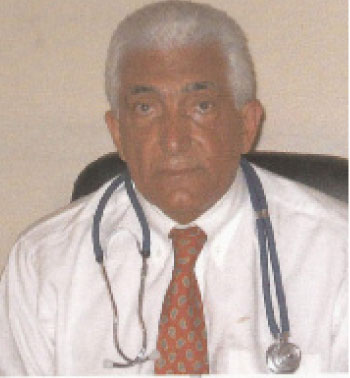
People with diabetes are at an increased risk of heart attack, stroke, skin disease, dental diseases, liver and kidney failure, blindness, loss of limbs, loss of muscle, and more.Diabetes is also one of the most expensive chronic conditions in any country and Gambia is not an exception.
Dr Hassan Azadeh, our health adviser and a senior lecturer at the University of the Gambia, who is also a senior consultant, physician, is this week focusing on why diabetes disease is more dangerous than everyone think and advice on the ways of prevention.
About Diabetes
Diabetes is a disease that affects how the body uses glucose, the main type of sugar in the blood. Glucose, which comes from the foods we eat, is the major source of energy needed to fuel the body’s functions. To use glucose, the body needs the hormone insulin. But in people with diabetes, the body either can’t make insulin or the insulin doesn’t work in the body like it should.
The two major types of diabetes are:
Type 1 diabetes is one in which the immune system attacks the pancreas and destroys the cells that make insulin.
Type 2 diabetes is one in which the pancreas can still make insulin, but the body doesn’t respond to it properly.
In both types of diabetes, glucose can’t get into the cells normally. This causes a rise in blood sugar levels, which can make someone sick if not treated.
Can Type 1 diabetes be prevented?
Type 1 diabetes can’t be prevented. Doctors can’t even tell who will get it and who won’t.
No one knows for sure what causes type 1 diabetes but scientists think it has something to do with genes. But just getting the genes for diabetes isn’t usually enough. In most cases, a child has to be exposed to something else like a virus to get type 1 diabetes.
Type 1diabetes isn’t contagious, so kids and teens can’t catch it from another person or pass it along to friends or family members. And eating too much sugar doesn’t cause type 1 diabetes, either.
While type 1 diabetes can’t be prevented, some research suggests that breastfeeding, avoiding early introduction of solid foods, and other factors might play a role in lowering the risk of developing the disease. There’s no reliable way to predict who will get type 1 diabetes, but blood tests can detect early signs of it. These tests aren’t done routinely, however, because doctors don’t have any way to stop a child from developing the disease, even if the tests are positive.
Effects of diabetes on fat and metabolism
Since the hormone insulin which breaks down glucose is lacking, in uncontrolled cases, the body starts using fat as the fuel source. While you might think it’s not such a bad idea to lose some fat, what this leads to is build up of by-products of fat digestion’. If you’re not taking your insulin doses regularly, have fever/diarrhea /vomiting and/or going through a lot of stress or an alcoholic, you need to be extra careful about developing this condition.If you develop symptoms like deep gasping breathing, acute pain in the abdomen, bad dehydration leading to weakness and fainting, vomiting, it’s time you take it seriously and contact your doctor.
Effects on the eyes
Retina (the innermost layer of your eye) is affected by ineffective blood glucose control. The small blood vessels in the retina are damaged and weakened. The early symptom of eye problems related to diabetes is blurred vision and double vision. It can also cause a severe, permanent loss of vision. Diabetes increases the risk of developing cataracts and glaucoma.
Effects on kidneys
If you notice swelling in your feet and legs or around your eyes, your kidneys might get affected because of the uncontrolled blood sugar levels. If you have hypertension (or high BP), your chances of developing this is even higher.
Effects on nerves:
Some of the nerves, especially around your peripheries like legs might get affected first leading to a loss of sensation. You might not be able to figure out if you have had an injury and it may end up getting infected. Diabetic gangrene (infection of the leg, leading to decay of flesh) can occur and the leg may have to be amputated. Uncontrolled diabetes can also affect nerves that control your heartbeat, blood pressure, digestion, blood flow to organs etc leading to diarrhea, erectile dysfunction, loss of bladder control, vision changes, and dizziness.
Effects on heart
If you are a smoker, have high blood pressure, are grossly overweight and/or have a family history of diabetes and are diagnosed with diabetes, you have a greater risk of developing heart disease, strokes.
Being overweight or obese is a risk factor for developing Type 2 diabetes, but it turns out that these heavier patients may have an advantage: people who are overweight when they are diagnosed with diabetes live longer than their thinner peers.
The so-called obesity paradox, in which being overweight appears to be protective against early death, has been seen before in heart failure and chronic kidney disease.
Overall, about 85% of people with diabetes are heavy. Gaining too much weight is a major contributor to Type 2 diabetes, since excess fat cells can affect the way the body breaks down glucose and produces insulin, but some normal weight individuals can develop the disease as well.
Further, to account for the possibility that the normal weight patients could have been losing weight due to other underlying illnesses, the researchers excluded people who died within two years of their diabetes diagnosis. The doubling of early death risk persisted.
“Doctors’ concern about normal weight people with diabetes should potentially be even higher than that for their counterparts who develop diabetes at a heavier weight,”
People with diabetes are at risk for blood vessel injury, which may be severe enough to cause tissue damage in the legs and feet. If nerve damage is also a problem, then the person may not be aware of the injuries that have occurred in their legs or feet.
At that point, minor infections sometimes develop into deep tissue injuries that may even require surgery. In extreme cases, amputation of the foot or limb may be necessary. Good foot care is very important to prevent problems.
Excess body weight is the single most important risk factor for type 2 diabetes, particularly those whose fat is distributed round their middle (apple shaped) rather than those whose fat is distributed on their hips and thighs (pear shape).
Risk of diabetes is approximately doubled for those who are moderately overweight and tripled for those with obesity.
Weight and type 2 diabetes
Most people are overweight when they’re diagnosed with type 2 diabetes. Being overweight or obese increases the risk for developing type 2 diabetes, and if someone who already has type 2 diabetes gains weight, it will be even harder to control blood sugar levels.
People with type 2 diabetes have a condition called insulin resistance. They’re able to make insulin but their bodies can’t use it properly to move glucose into the cells. So the amount of glucose in the blood rises. The pancreas then makes more insulin to try to overcome this problem.
Eventually, the pancreas can wear out from working overtime and may no longer be able to produce enough insulin to keep blood glucose levels within a normal range.
People with insulin resistance are often overweight and don’t exercise very much. But weight loss, eating healthier foods and controlling portion sizes, and getting exercise can actually reverse insulin resistance. For people with type 2 diabetes, doing so makes it easier to reach target blood sugar levels and, in some cases, the body’s ability to control blood sugar may even return to normal.
For further information, get in touch with ‘Gambian Diabetes Association’ Dr Alieu Gaye, a diabetes specialist of Pakala Clinic, National Nutrition Agency (NaNA)’ and visit government hospitals and clinics, NGO and private clinics, or call at Afri- Radio DR Azadeh live health show every Wednesday from 9-9.30 am, or send e mail to azadehhassan@yahoo.co.com, or text to 00220-7774469.


